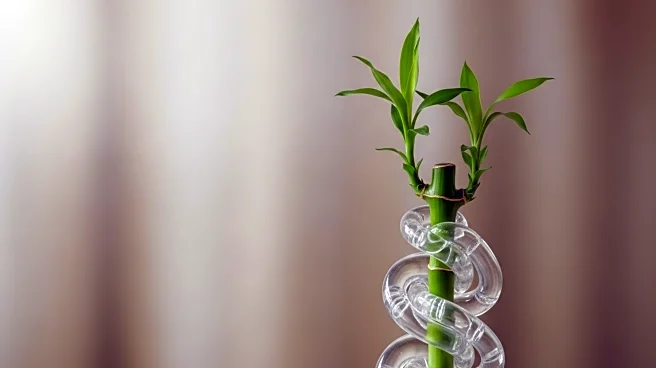What is the story about?
What's Happening?
Researchers at Shenyang University of Chemical Technology in China have developed a new type of biodegradable plastic made from bamboo cellulose. This innovative material is as strong and durable as conventional plastics used in household appliances and car interiors, yet it is recyclable and biodegrades easily in soil. The process involves treating bamboo with zinc chloride and a simple acid to break down chemical bonds, followed by the addition of ethanol to solidify the cellulose into a strong plastic. Despite its rigidity limiting its use compared to more flexible plastics like polyethylene, the bamboo-based plastic retains 90% of its original strength after recycling, making it economically attractive. The development of this plastic addresses the mechanical strength limitations of existing bioplastics, which currently constitute only a small fraction of global plastic production.
Why It's Important?
The introduction of bamboo-based biodegradable plastic represents a significant advancement in sustainable materials. As bamboo is a fast-growing, renewable resource, this development could reduce reliance on oil-based plastics, which are less environmentally friendly. The ability to recycle the plastic while maintaining its strength offers a potential solution to sourcing concerns associated with traditional engineering plastics. This innovation could lead to increased adoption of bioplastics in industries such as automotive and appliance manufacturing, promoting environmental sustainability. However, the higher cost compared to conventional plastics may affect its widespread adoption, necessitating further research to optimize production costs.
What's Next?
Further research and development are likely to focus on reducing production costs and expanding the applications of bamboo-based plastic. Industries that rely on engineering plastics may explore integrating this material into their products, potentially leading to collaborations with researchers to refine the technology. Additionally, environmental groups and policymakers may advocate for increased use of biodegradable plastics to address plastic pollution. Monitoring the market response and consumer acceptance will be crucial in determining the future impact of this innovation.
Beyond the Headlines
The development of bamboo-based plastic highlights the growing interest in sustainable materials and the potential for bioplastics to transform industries traditionally reliant on oil-based products. Ethical considerations regarding the sourcing and production of bamboo, as well as the environmental impact of its cultivation, may arise as demand increases. Long-term shifts in manufacturing practices could lead to a more circular economy, reducing waste and promoting resource efficiency.
















